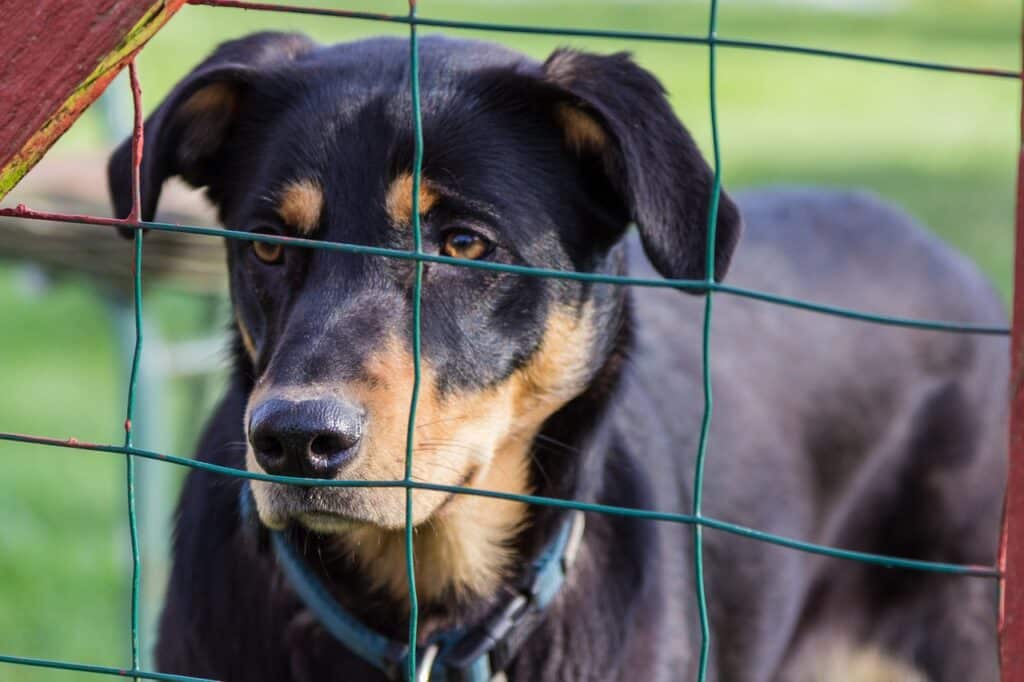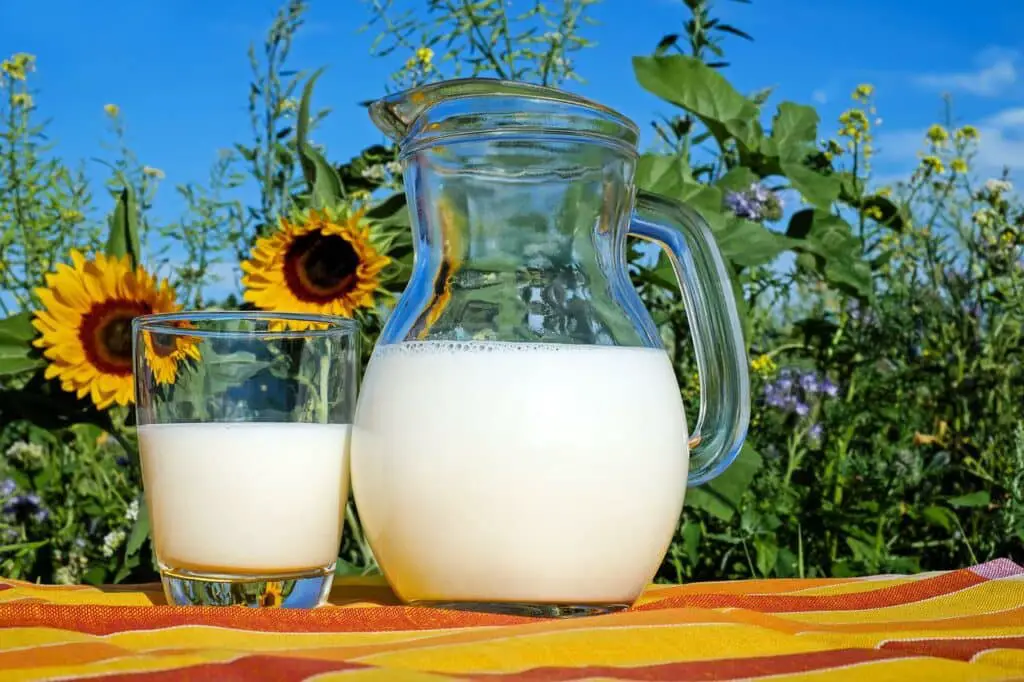Cashew milk is probably one of the healthiest plant-based milks out there.
It’s high in vitamins and minerals, low in calories, and has no cholesterol.
This may lead you into thinking that it would be perfectly safe for your dog to consume, but is it?
So, can dogs have cashew milk?
Yes, but in moderation.
Cashew milk contains many nutrients such as vitamins, minerals, antioxidants, and heart-healthy fats beneficial for your dog’s health.
However, it’s high in fats, which could lead to weight gain for your dog.
This article discusses feeding cashew milk to your dog and what to keep in mind if you decide to let them enjoy this creamy treat.
Read on to learn more.

Benefits of cashew milk for your dog
Cashew milk is rich in the following nutrients:
- Omega-3 fats
- Antioxidants
- Vitamins C, A, and K
- Protein
- Calcium
- Minerals-magnesium and phosphorous.
When your dog ingests cashew milk, they benefit in the following ways from the nutrients:
Thick, shiny coat
Cashews are rich in zinc and omega-3 fatty acids.
These nutrients promote a healthy coat and skin for your dog.
A strong immune system
The antioxidants present in cashew milk help boost your pup’s immune system.
They include selenium, vitamin C, and magnesium.
Good mood balance
Cashews are also a good source of tryptophan.
Tryptophan is an amino acid that helps to produce serotonin.
Serotonin is a neurotransmitter that plays a role in maintaining mood balance.
This means that cashew milk can help to keep your pup calm and relaxed.
Improved joint health
The fatty acids present in cashews can help to reduce inflammation and improve joint health.
Your dog will move around more easily and with less pain.
Healthy digestion
Cashews are a good source of dietary fiber, which helps add bulk to the dog’s stool and aid in their digestion.
Strong bones
Cashews are a good source of calcium and phosphorus.
These minerals are essential for strong bones and teeth.
Muscle development
The protein present in cashews helps to build and repair muscles.
Cashew milk is easy for the dog’s system and is a good quality protein source.
Your dog will easily digest this milk if they are lactose intolerant.

Are there any risks of giving my dog cashew milk?
While your dog reaps many benefits from drinking cashew milk, some risks can be considered.
Watch out for the following risks:
Gastrointestinal upsets
When your dog consumes cashew milk in excess, they may experience gastrointestinal upsets such as vomiting and diarrhea.
If your dog experiences these symptoms, stop giving them cashew milk and offer them plenty of water to prevent dehydration.
Weight gain
Cashew milk is high in fat.
If your dog consumes too much of it, they are likely to gain weight.
Giving cashew milk to overweight dogs presents risks of developing health problems such as joint problems, obesity, and respiratory difficulties that will impact severely.
Cashew allergies
Like people, some dogs may be allergic to cashews.
Dogs’ allergic reactions can manifest as gastrointestinal upsets, skin problems (itches, hives, and swelling on the skin), and respiratory difficulties.
If you notice your dog displaying any of these symptoms after drinking cashew milk, stop giving it to them and consult your veterinarian.
Pancreatitis
When your dog ingests too much fat present in the cashew milk, it can lead to pancreatitis.
This is a serious condition that can be life-threatening.
Symptoms of pancreatitis in dogs include vomiting, abdominal pain, lethargy, and appetite loss.
How much cashew milk should I give my dog?
When introducing cashew milk to your dog, start with small amounts.
Give them a few tablespoons per day and watch for any adverse reactions.
If your dog tolerates the cashew milk well, you can gradually increase the amount you give them.
A good rule of thumb is to offer no more than 1 ounce of cashew milk per 10 pounds body weight in a day.
When giving your dog cashew milk, consult with your veterinarian first.
What should I keep in mind when feeding my dog cashew milk?
Before giving your pup cashew milk, it’s important to keep a few things in mind:
- Cashew milk should not be the only source of fluid for your dog. Make sure they have access to fresh, clean water at all times. Give cashew milk as a treat and follow the treat’s rule; they should not exceed 10% of your dog’s daily caloric intake.
- Give your pup cashew milk that is unsweetened, plain, and without added flavors or ingredients. Additives such as sugars, chocolate, xylitol, and grape flavorings are toxic to your dog.
- Give your dog only fresh cashew milk that has been prepared within the past 24 hours. Don’t give them spoiled or expired milk, leading to food poisoning.
- Ensure that your dog’s cashew milk does not contain any nuts, as these can pose a choking hazard.
- Opt to prepare your dog’s cashew milk at home rather than purchasing it from the store. This way, you can control the ingredients that go into it and ensure it’s safe for your pup. Store-bought cashew milk contains sweeteners and other elements such as preservatives that can make your dog sick.
- Do not give your dog cashew milk if they are overweight or have
hasdiabetes. The high calories and fat content will worsen these conditions. If your furry friend has a specific health condition or is on a special diet, consult your veterinarian before giving them cashew milk.
- It’s advisable to heat the milk and cool it before giving it to your pup. This will help kill bacteria present in the milk.
Can I mix cashew milk with cow milk and serve my dog?
You should not mix cashew milk with cow milk and serve it to your dog.
The two types of milk have different nutritional profiles, and mixing them can cause digestive upset in your pup.
If you want to give your dog cow milk, do so separately.
However, you can combine cashew milk with other dog-friendly liquids such as water or chicken broth.
This can help make the cashew milk more palatable for your pup and increase their fluids intake.
Are there healthy alternatives to cashew milk for my dog?
Yes, there are healthy alternatives to cashew milk that you can give your dog.
These include:
- Water: The most important fluid for your dog is water. Ensure they have access to fresh, clean water at all times.
- Chicken broth: Chicken broth is a great way to increase your dog’s fluid intake. It’s packed with nutrients and electrolytes that can benefit your pup.
- Vegetable broth: Vegetable broth is a great and healthy alternative or additive to cashew milk. It’s low in calories and will help increase your dog’s fluid intake. Nutritious vegetable broths include pumpkin, sweet potato, carrot, and spinach.
- Fruit juice: You can give your dog 100% fruit juice. Ensure the juice doesn’t contain added sugars or unsafe ingredients for your dog.
- Coconut water: Coconut water is a great source of electrolytes and is low in calories. It’s a good option to give your pup if they are dehydrated or need an extra boost of hydration.
Frequently asked questions (FAQs)
Can puppies have cashew milk?
Yes, puppies can have cashew milk in moderation.
However, it shouldn’t replace their regular water intake.
Start with giving the puppy small amounts and watch for any adverse reactions.
Can lactose-intolerant dogs have cashew milk?
Yes, lactose-intolerant dogs can have cashew milk as it’s lactose-free.
However, start with small amounts and watch for any adverse reactions.
Some dogs may be allergic to nuts, so stop giving your pup cashew milk and consult your veterinarian if you notice any signs of an allergic reaction (e.g., vomiting, diarrhea, and hives).
Can dogs have cashew butter?
Yes, dogs can have cashew butter if it doesn’t contain added sweeteners or ingredients that aren’t safe for your dog.
The bottom line
Cashew milk is a nutritious treat that you can give your dog.
It’s packed with essential nutrients to keep your pup healthy and strong.
When feeding your dog cashew milk, give it in moderation as part of a well-balanced diet.
If you’re unsure about giving your dog cashew milk, consult with your veterinarian.
- What Dog Breeds Have Pink Skin? - March 24, 2023
- What Are the Most Inspiring Dog Breeding Quotes? - March 20, 2023
- Can Pheromone Spray Help Improve Dog Breeding Results? - March 19, 2023








